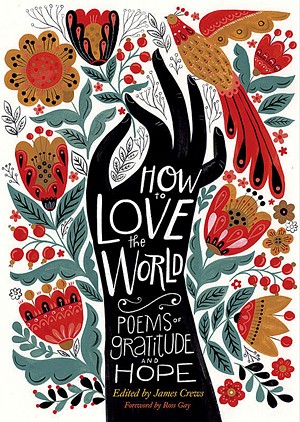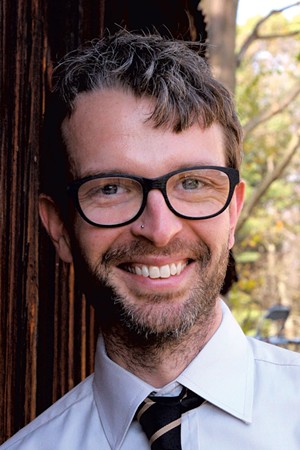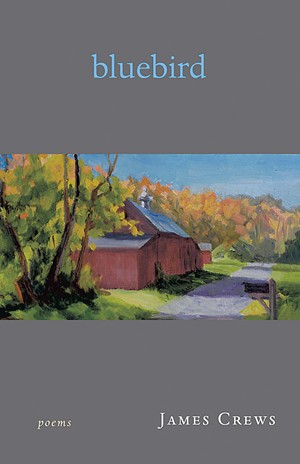
- Courtesy
- How to Love the World: Poems of Gratitude and Hope, edited by James Crews, Storey Publishing, 208 pages. $14.95.
This January, Amanda Gorman's reading at the presidential inauguration rocketed her to international fame and put poetry back on the map. Gorman's "The Hill We Climb" — a poem of steadfast hope, delivered with fierce sincerity — proved to be a message that listeners around the world desperately needed.
Shaftsbury poet and editor James Crews was hip to Gorman's verses long before the inauguration. Her work appears in his latest anthology, How to Love the World, which features an all-star lineup, including current U.S. Poet Laureate Joy Harjo, Tracy K. Smith and Naomi Shahib Nye, as well as Vermont poets Laura Foley, Patricia Fontaine, Mary Elder Jacobsen, Judith Chalmer, Alice Wolf Gilborn and Garret Keizer.
This isn't Crews' first rodeo as an anthologist. In 2019, he edited Healing the Divide: Poems of Kindness & Connection, a poetry anthology devised specifically to bridge the intensifying negativity that has seized America's political and cultural landscape. To accomplish this, Crews enlisted poets such as Ross Gay, author of Catalogue of Unabashed Gratitude and best-selling essay collection The Book of Delights. Gay's writing illustrates that poetry isn't the exclusive domain of the melancholic: His poems celebrate moments of joy large and small, from picking figs with strangers to the "small, needful fact" of how Eric Garner — a Black man strangled by New York City police in 2014 — worked as a horticulturist.
How to Love the World, for which Gay wrote the forward, is essentially an entire anthology devoted to this form of witness and gratitude, what he defines as "Our radiant need. Our luminous and mycelial need."

- Courtesy
- James Crews
The opening poem, Rosemerry Wahtola Trommer's "Hope," sets the tone for the chorus of voices to follow. "Hope has holes / in its pockets. / It leaves little / crumb trails / so that we, / when anxious, / can follow it. / Hope's secret: / it doesn't know / the destination."
In "The Once Invisible Garden," Pomfret poet Foley asks, "What luck or fate, instinct, / or grace brought me here?" Heather Swan in "Rabbit" writes of "this unstoppable / excruciating tenderness everywhere."
This flood of gratitude is rare to encounter all at once, all in the same place, and the effect is almost medicinal: poetry as antidote.
As editor and guide, Crews employs "Reflective Pauses" as section breaks, an innovative format that provides readers with a natural place to pause and meditate on what they've read so far. It's more than simply a visual break from the poetry; Crews briefly analyzes the text and offers practical suggestions on how to incorporate the poems' messages, as in this reflection on page 125.
As Andrea Potos's "Essential Gratitude" points out, the sensation of appreciation can come out of nowhere and pierce our hearts until we find ourselves making a whole list "in the air" of those everyday things we might otherwise look past or ignore. One of the most potent practices we can adopt is including a gratitude list as part of our journaling or writing practice, in the morning or at night before bed.
At times, the tendency for poets to enumerate what they're grateful for might get exhausting for some readers. The sumptuousness makes for a refreshing break from the rather tortured tone of most contemporary poetry, but surely not everyone can relate to a daily cornucopia of fresh vegetables ready to be cooked, a perfect sun setting over a loving family, a faithful hound at the bedside?
Crews is wise to include writers who push back against these materialist aspects of gratitude. Tracy K. Smith, who served as U.S. poet laureate from 2017 to 2019, writes in "The Good Life": "When some people talk about money / They speak as if it were a mysterious lover / Who went out to buy milk and never / Came back." Moments like these help ground the anthology by complicating gratitude and hope with the sorts of everyday human struggle that usually gets cropped out of the Instagram-ready curations of our lives.
Fittingly, How to Love the World ends on one of these nuanced notes, with a gorgeous prose poem by Mark Nepo, which concludes: "Like a worm cut in two, the heart only grows another heart. When the cut in my mind heals, I grow another mind [...] I fall. I get up. I run from you. I look for you. I am again in love with the world."

- Courtesy
- Bluebird by James Crews, Green Writers Press, 74 pages. $14.95.
Crews' latest solo book, Bluebird, is an excellent window into the editor's worldview and aesthetics. Released during last year's terrifying spring, it's a slim volume of affirming love poems and spiritual meditations, written well before COVID-19 invaded our lives. Still, Bluebird feels like a determined attempt to counter the terror consuming us then — another desperately needed antidote.
Nothing is cryptic in Crews' refreshingly wholesome love poems. "Heat" begins: "Words can't capture the sensation / of actually kissing you, the fit / of lips made for each other." Stripped of any coyness or artifice, sincerity rushes in to take their place. Some readers may interpret this as a lack of complexity, but others will be grateful to encounter a book of poems they can decipher without an advanced degree.
Direct and plainspoken, many of these poems feel akin to notes passed between lovers. An early poem, "Tablet," depicts this very image. Rather than the iPad readers might have expected to encounter, Crews describes ripping out a blank sheet of paper from a notebook on the kitchen counter and finding the palimpsest of a love note his husband had left in his pants pocket for him to find.
I'd meant to use the paper for a grocery list
but couldn't force myself to mar the surface
of what now seemed an artifact: I held it up
to the sunlight and traced the places where
the pen-tip had carved his name at the bottom
like an ancient stylus pressing into wet clay
the oldest love poem ever found.
In his song "Anthem," Leonard Cohen sang, "There is a crack, a crack in everything / that's how the light gets in" — a poeticism that Crews tends to invert. Here and there among the gratitude and affirmations, glimmers of darkness make their way into the poems, and these make for some of the most satisfying moments. In "The Present" for example, the poet describes various gifts — the rustling of cattails, an old wool blanket — before ending with the image of a friend's face who will soon begin radiation treatment: "It is the present / of enough time and space / to look into her tired face / and see the eyes of a child / staring back at you / through the fear."
These moments that acknowledge painful aspects of life make the rest of the book feel more earned. The love poems seem to grow in stature after lines such as these in "Kintsugi": "Anyone who loves someone else / already has a broken heart. / It's the law: If you want that light / to flood your body, you must / expose the cracks through which / it pours."
Kintsugi refers to the Japanese art of repairing broken pottery with metallic lacquer. The fact that we can be shattered and remade, our scars rendered gold, is just about the most anyone could ask for. To be reassured of this in poems is a rare treat.
From Bluebird: "Time Capsule of the Early 21st Century"
All the love songs were about
finding different ways to talk
of the sky, especially at night—
that blue before the black—
which is to say, we wanted
to pray but were too afraid
to ask for help, too busy to kneel.
We had learned to subsist
on so little hope that any scrap
was welcome, like ants clamoring
for a grain of sugar in a bowl
of nothing but salt. If you
could still see the constellations
through the ever-brightening
skyglow of light pollution,
you'd notice they were beautiful—
the glittering plan and pattern
of things not made by humans,
bodies not meant to harm.
The stars gave even the hardest
among us a hint of pleasure
as we caught a glimpse of them
through a lover's window
or while leaving a nightclub,
when we remembered to look up
long enough to be amazed.
Reprinted with permission from Green Writers Press.








Comments
Comments are closed.
From 2014-2020, Seven Days allowed readers to comment on all stories posted on our website. While we've appreciated the suggestions and insights, right now Seven Days is prioritizing our core mission — producing high-quality, responsible local journalism — over moderating online debates between readers.
To criticize, correct or praise our reporting, please send us a letter to the editor or send us a tip. We’ll check it out and report the results.
Online comments may return when we have better tech tools for managing them. Thanks for reading.